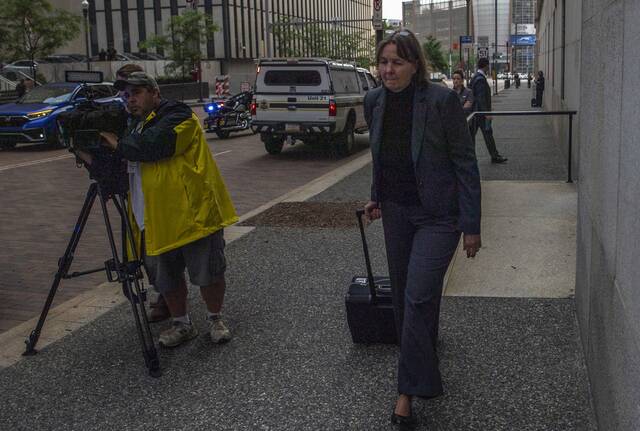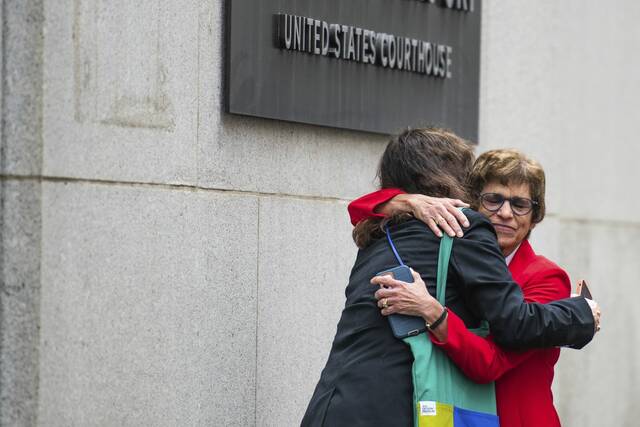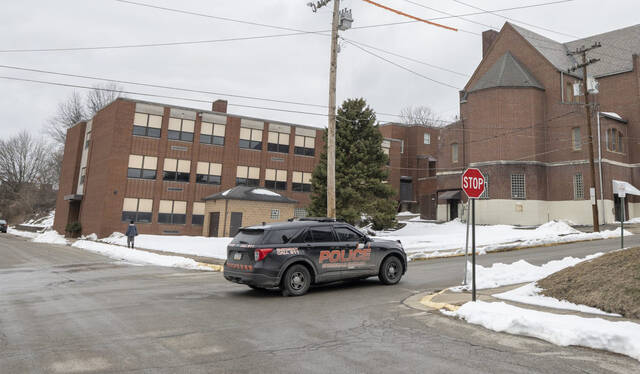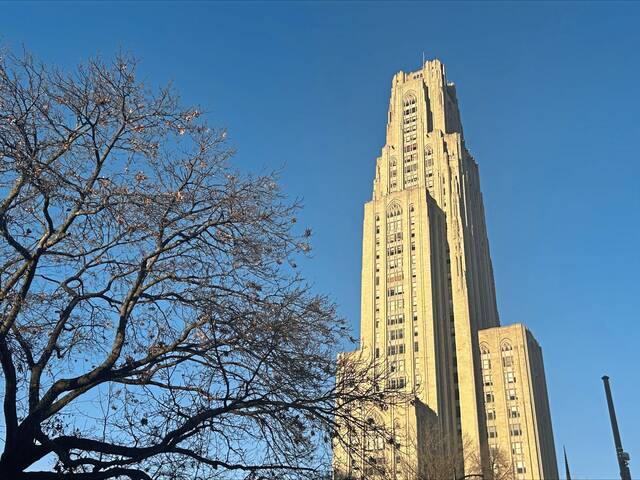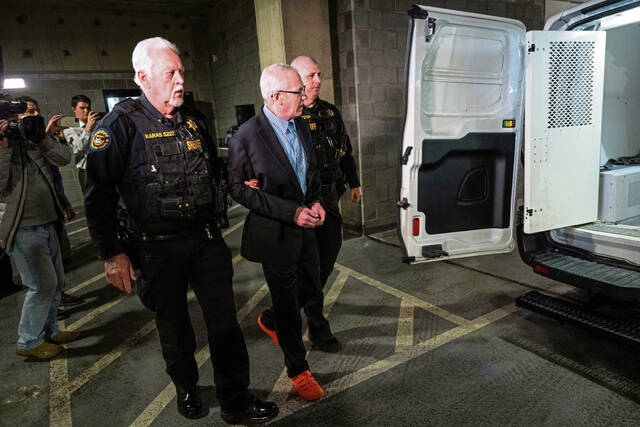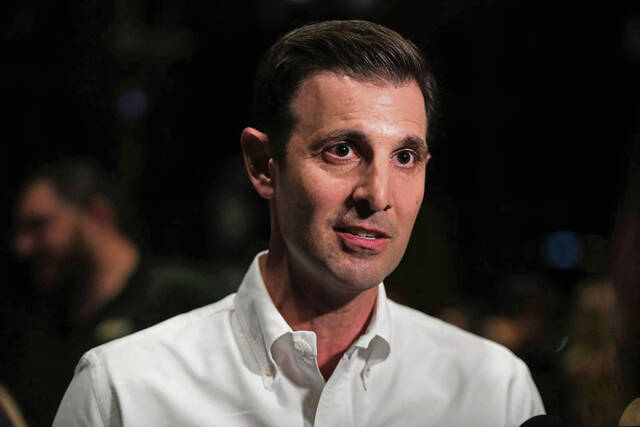The defendant was apprehended inside the Squirrel Hill synagogue and confessed to police who wounded him in a gunbattle.
At trial, the opening words of his defense team included an admission that their client killed 11 people who were worshipping inside the Tree of Life synagogue on the morning of Oct. 27, 2018.
The case involving Robert Bowers, 50, of Baldwin moves on Monday to the only part that has ever been contested: whether he should pay with his life.
The government thinks so and will make its case — that if a federal death penalty exists, surely this is the time for it — through emotional victim impact testimony and evidence of Bowers’ extensive, hate-filled, antisemitic rants online.
The defense, unlike in the guilt phase, will have its own evidence to present — including that their client is mentally ill and how he became exposed to that hate.
The penalty phase will be divided into two parts — first eligibility and later sentence selection — and is expected to last up to five weeks.
‘The reality of federal death row’
There are 43 people on federal death row, which is housed at the Special Confinement Unit at the U.S. Penitentiary in Terre Haute, Ind.
Of those, 19 people are white, 17 are Black, six are Latino and one is Asian, according to the Death Penalty Information Center. The oldest conviction dates to 1993, the most recent 2019.
The majority of prisoners on federal death row, said Robert Dunham, the previous executive director of the center and adjunct faculty member at Temple University law school, are there for killing someone in relation to a drug crime or bank robbery or while in prison.
Only one person is there for terrorism.
“Most Americans think it’s used for hate crimes or terrorism,” Dunham said. “The reality of federal death row is completely different from the public’s perception of federal death row.”
After being struck down by the U.S. Supreme Court in 1972, the federal death penalty was reinstated in 1988. From that year until 2020, three people were executed. Then, in the last six months and one day of former President Donald Trump’s administration, 13 federal inmates were put to death, more than had been carried out by any American president dating to the 1800s, Dunham said.
In July 2021, U.S. Attorney General Merrick Garland issued a moratorium on the federal death penalty. His aim was to examine the procedures used under the Trump administration to make executions easier to pursue. Bowers’ defense attorneys noted in a motion in April that under the Biden administration, the Justice Department has withdrawn its notice to seek the death penalty in 23 cases and has chosen not to seek capital punishment against 389 defendants potentially eligible for it.
The Bowers case is the only one active in the federal system.
Penalty phase
To obtain a death sentence, the government must prove to a unanimous jury at least one aggravating factor beyond a reasonable doubt.
In the Bowers case, the aggravating factors enumerated by the government include that he created a grave risk of death to 12 additional people; that the crime involved substantial planning and premeditation; that those killed were considered “vulnerable victims” because of their age and intellectual disabilities; and that there were multiple killings.
The government also has alleged that the killings were motivated by religious animus.
If the jurors find the existence of an aggravating factor, they then must weigh that against any mitigating evidence individual jurors found — which is only to a preponderance standard.
The defense can raise almost anything as a possible mitigating circumstance, said Martin Dietz, a defense attorney who represented Jelani Solomon, the last person from the Western District of Pennsylvania who was tried in a federal capital case.
During jury selection in the synagogue case, defense attorney Matthew Rubenstein repeatedly told jurors that mitigation could be something as simple as Bowers’ mother loves him or that he’s been well behaved in prison.
In the Bowers case, it’s unclear what mitigating evidence — in addition to his having been diagnosed with schizophrenia and epilepsy — will be presented. Prior to the attack at the synagogue, Bowers had no criminal history. During closing arguments, the defense presented him as a loner who spent a lot of time “absorbing all kinds of vile, extremist content.”
The defense will work to humanize their client in whatever evidence is presented, Dietz said.
“You want the jury to see he acts like a human being — that he’s not a hardened, malicious killer,” he said.
To sentence Bowers to death, the panel must be unanimous. If anyone refuses to vote for death, the sentence is automatically life in prison with no possibility of release.
“All they need is one juror,” Dietz said.
In the Solomon case, which was tried in 2007, the jury split on a sentence, voting 9-3 in favor of the death penalty. Because they were not unanimous, Solomon, who was convicted of ordering the contract killing of a man whose son was a police informant in a drug case against him, received a life sentence.
Aggravating factors against Solomon were that he paid to have the victim killed and that the crime required substantial planning and premeditation.
In mitigation, the defense team hired an expert who interviewed every living relative of their client. They presented evidence to show how difficult his childhood was, including that he was raised surrounded by drugs.
Among the mitigators that jurors found in the Solomon case:
• A co-defendant received a prison sentence and not capital punishment
• Solomon had a “chaotic, abusive and neglectful childhood”
• He did not have a good father
• As a child, he was surrounded by drug users and drug dealers
• He had responded well to structured environments
To gather that information, Dietz said, their expert combed through records from school; Children, Youth and Families; and youth detention centers.
During the Bowers sentencing, much of the government’s focus will be on victim impact evidence, including the quality of the lives lost and the impact of that loss on their survivors, said former federal prosecutor Nathan Williams.
“You’ve already gotten a preview of that,” he said, referencing testimony during the guilt phase.
Williams was the lead attorney in the death penalty case against Dylann Roof, who killed nine Black parishioners at the Emanuel African Methodist Episcopal Church in Charleston, S.C., in 2015.
He said the prosecution won’t want to come across as bloodthirsty. Instead, Williams said, he expects the government will focus on the presentation of its case to the jury, that this crime “is the most egregious set of facts out there, that that many victims should (elevate Bowers to) the worst of the worst.”
That death “is just the right decision.”
Williams said he expects Bowers’ antisemitic posts on Gab.com, a far-right social media network, will continue to be a focus for both the government and the defense.
Bowers’ attorneys called no witnesses during the guilt phase, but they hinted during closing arguments that his online activity would be examined during the penalty phase.
Williams said they could attempt to tie Bowers’ white supremacist views and possible radicalization to his mental health issues.
“It will be interesting to see if they link that: ‘But for the mental illness, this would not have happened,’ ” Williams said.
What will be admissible?
Both sides have been litigating a number of issues relative to what will be admissible during the penalty phase and what will not.
It is common for prosecutors in a capital case to argue about a defendant’s potential for future dangerousness and to describe their conditions of confinement if they get a life sentence instead of death — for example, that they will have a television, access to recreation and mail, Williams said.
Bowers’ attorneys filed a lengthy motion last week asking that the government be precluded from making an argument to the jury about either of those issues, as well as several more, including that the jurors should vote for death to send a message and that it’s their civic duty.
The government also filed motions last week. It is seeking to prohibit the defense from arguing to the jury about disproportionality in how the death penalty is sought; the lack of a deterrent effect; that Bowers offered to plead guilty in exchange for a life sentence; and the effect execution would have on the defendant’s loved ones.
“A lot of these arguments are made in every case,” Dietz said.
Williams agreed.
“It’s just good lawyering on both sides to get as much clear with the judge beforehand,” he said.
Williams said he does not expect a lot of the information already introduced will be repeated in the penalty phase.
“My guess is there was some that was held back in the guilt phase,” he said. “Expect that to be amplified.”



